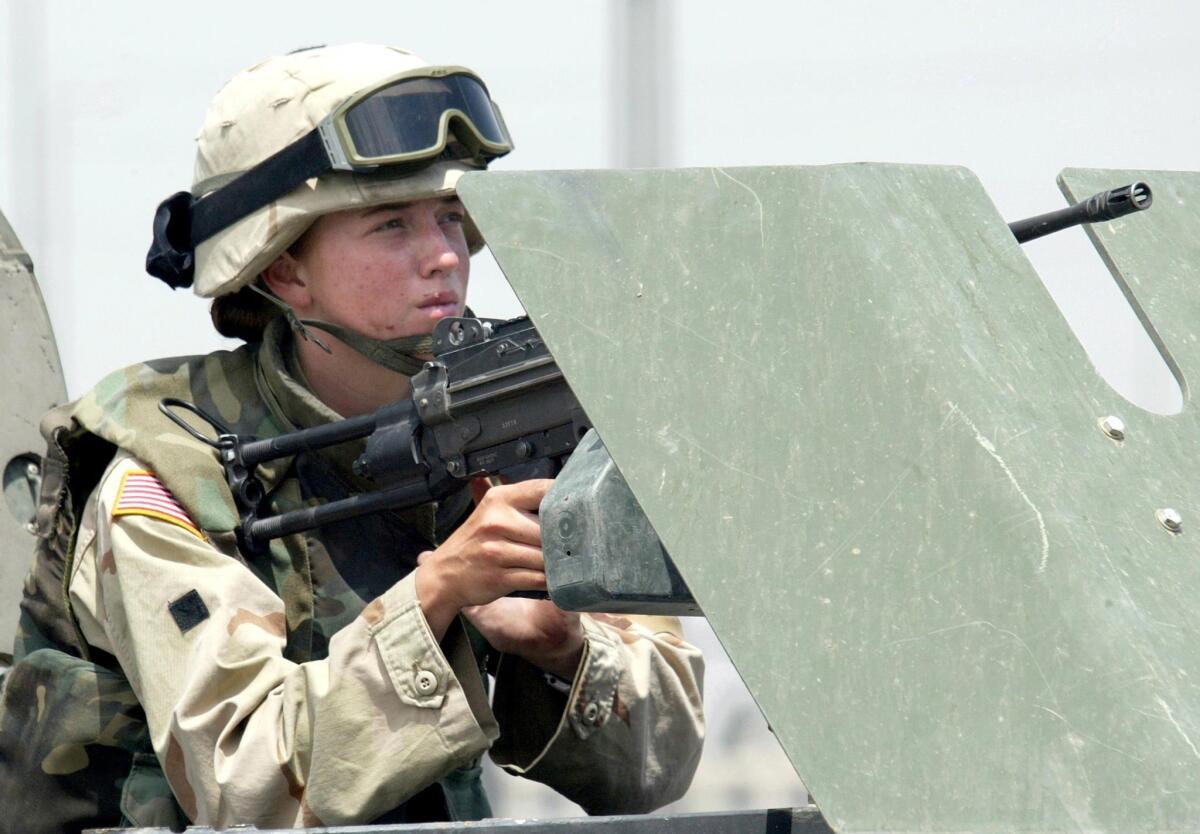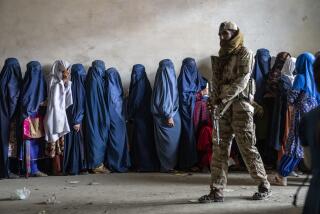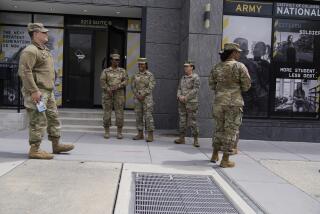Opinion: Pentagon declares women can hold jobs in combat -- you mean, they weren’t already?

A female U.S. soldier manning a machine gun on a vehicle during clashes in the northern Iraqi city of Mosul.
Historic and long overdue, Defense Secretary Ashton Carter’s decision to open all combat jobs in the military to women reflects the reality of what has already been happening in war for years. American women have been serving, dying and getting decorated for their heroism under fire the entire length of the Iraq and Afghanistan wars. They have driven convoys while dodging enemy bullets, flown airplanes and helicopters, ministered as medics. Cultural support teams of women soldiers accompanying Army special-operations units were specially trained to interview and communicate with Iraqi and Afghan women who might resist cooperating with men due to cultural norms. Out of more than 6,600 U.S. military deaths in Iraq and Afghanistan, about 160 of those were women.
The only jobs women couldn’t have were direct combat ones. Yet in these past wars without traditional front lines, combat found them anyway. The fact that Iraq and Afghanistan were 360 wars and women were involved spurred a reevaluation of women’s roles in the military. In November 2012, the American Civil Liberties Union filed a lawsuit on behalf of four servicewomen and the Service Women’s Action Network against the Department of Defense for its blanket rule excluding women from combat units and training schools. Carter’s decision officially removes all restrictions on qualified women having jobs in direct combat or vying for positions on Navy SEAL teams and in other elite units.
It seems almost quaint that we are even having this discussion. Yet, military combat may be the last totem of male superiority to topple.
Getting to this decision took a while. In January 2013, then Secretary of Defense Leon Panetta said the ground combat exclusion should be lifted and directed the services to come up with plans to do so — or offer justifications why exclusions should continue. On Thursday, Carter said the only branch of service requesting an exception to the rule was the Marine Corps. That branch won’t get it, Carter said Thursday.
After all these years, it’s good to see Carter’s decision go into effect swiftly and broadly. Consider that there’s literally no other area of public or civil service in this country that women are barred from. In law enforcement, they already carry guns and fire them when necessary. In Iraq and Afghanistan, women soldiers carry arms and fight back when under attack. It seems almost quaint that we’re even having this discussion. Yet, military combat may be the last totem of male superiority to topple. The resistance to gender integration in the military has generally been along the lines that it would undermine morale and “unit cohesion” — arguments made during every (ultimately successful) wave of integration in the military. And in terms of military close quarters — women already serve on submarines.
Two things should guide the military as it opens all jobs to women: It should work to make sure that mechanisms are in place to guard against and address sexual harassment — a problem the military has had much trouble dealing with in the past. And it should never compromise standards for anyone, man or woman, serving in combat to meet the physical standards necessary. Several years ago, Congress made a smart move when it mandated that the military services should set gender-neutral standards which both men and women must meet. That wasn’t designed to lower military standards, it was intended to make the military focus on what exactly its jobs required. That way, service will always be about skills, not gender.
Follow the Opinion section on Twitter @latimesopinion
More to Read
A cure for the common opinion
Get thought-provoking perspectives with our weekly newsletter.
You may occasionally receive promotional content from the Los Angeles Times.







